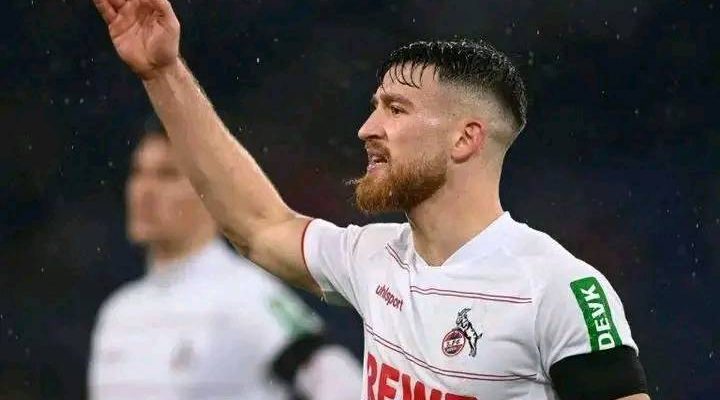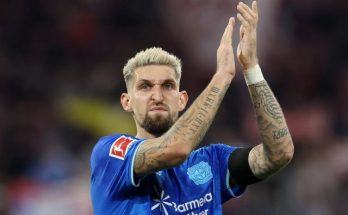Transfer hammer in the Bundesliga! The football world is in shock after news broke that Salih Özcan has surprisingly terminated his contract with Borussia Dortmund and is returning to 1. FC Köln. This move was not on anyone’s radar, not fans, not experts, not even the rumor mill that constantly churns out speculation during transfer windows. It is one of those rare cases in modern football where a player follows his heart rather than the conventional trajectory of career progression. For Dortmund, it is a stinging loss of a versatile and reliable midfielder, but for Köln, it is a homecoming that feels almost poetic. The emotional resonance of this transfer has already shaken the Bundesliga, creating an atmosphere of anticipation and debate unlike few others in recent years.
Salih Özcan’s decision is rooted in identity, belonging, and emotion. Born and raised in Cologne, Özcan came through the club’s academy, a product of the RheinEnergieSTADION’s footballing soul. He was seen as one of the brightest prospects in German football during his youth career and became a mainstay in Köln’s midfield before making the big move to Borussia Dortmund. At BVB, he carved out a respectable role for himself, contributing in both domestic and European competitions, often admired for his stamina, aggression, and tactical discipline. He was never the flashiest player on the pitch, but managers and teammates appreciated his dependability and willingness to do the dirty work. Leaving Dortmund, especially after cementing a role in such a prestigious club, would ordinarily be seen as a step down. But Özcan’s heart pulled him back to where it all began, and in football, sometimes the heart makes the most powerful decisions.
The news hit Cologne like a thunderbolt of joy. For the fans of 1. FC Köln, Özcan is more than just a footballer—he is a symbol of their identity. The club has always prided itself on being a family, a place where passion and loyalty are more important than glamour and trophies. In Özcan, they see someone who embodies their values, someone who chose them not because it was the most lucrative or glamorous option, but because it was home. The moment the announcement was made, social media exploded. Fans flooded timelines with photos of Özcan’s early days in Köln colors, clips of his performances as a teenager breaking into the first team, and messages filled with gratitude and excitement. For many, this transfer feels like the return of a lost son who has finally come home.
From Dortmund’s perspective, it is a bitter pill to swallow. Özcan was not always in the spotlight, but he offered tactical balance in midfield, often shielding the backline and enabling the more attacking players to flourish. Losing him leaves a gap in terms of depth and reliability. Dortmund fans are disappointed, not because Özcan was their star, but because his presence had become part of the squad’s backbone. His departure, especially in such a sudden and unexpected manner, raises questions about the club’s planning and whether they underestimated the pull of Köln on the player’s heart.
For the Bundesliga as a whole, this transfer is fascinating. It highlights a different narrative in modern football—a reminder that not all players are motivated solely by money, fame, or silverware. Sometimes, emotion, community, and personal identity can drive decisions that shock the establishment. Özcan’s move back to Köln is a statement that loyalty and belonging still matter in a sport increasingly dominated by business and commercial interests. The Bundesliga, known for its close connection between clubs and supporters, thrives on such stories. They enrich the league’s character and ensure that fans stay emotionally invested, not just in victories, but in the human narratives behind the players.
On the pitch, what does Özcan bring back to Köln? His versatility in midfield cannot be overstated. He can play as a holding midfielder, breaking up play and shielding the defense, but he is equally comfortable as a box-to-box player, covering every blade of grass and linking defense to attack. Köln have often struggled with consistency in midfield, lacking a player who can impose structure and rhythm in high-pressure matches. Özcan immediately changes that. His Bundesliga experience, coupled with the development he gained at Dortmund, makes him a leader figure upon his return. At 27, he is in his prime years, and this could be the period where he combines his maturity with peak physical ability. For Köln’s younger players, his presence in the dressing room is invaluable—a role model who proves that dreams can be achieved while staying true to one’s roots.
The tactical implications are equally intriguing. Köln have often relied on grit and collective spirit to grind out results, but with Özcan anchoring the midfield, they gain stability and reliability. His ball-winning ability allows creative players to roam more freely, knowing that Özcan is covering the spaces behind them. His calmness under pressure, ability to distribute quickly, and experience in big matches with Dortmund add a layer of confidence to the squad. It also offers the coach more flexibility. With Özcan, Köln can play with greater intensity in pressing systems, knowing he has the stamina to sustain the effort for ninety minutes. In slower, possession-based games, he can act as the pivot, dictating tempo and recycling the ball efficiently. In short, his impact on the field could be transformative.
The emotional weight of this transfer cannot be separated from its footballing significance. For Cologne, this is more than just strengthening the squad. It is about identity. The club has had its share of ups and downs, from relegations to promotions, from scraping survival to dreaming of Europe. Through it all, the fans have remained fiercely loyal, filling the stands regardless of circumstances. To have one of their own return in such a manner is almost a reward for their unwavering faith. The chants at the RheinEnergieSTADION will undoubtedly be louder, more passionate, when Özcan’s name is called out. For him, every match will carry an extra layer of emotion—he will not just be playing football, he will be playing for his home, his city, his people.
The reactions from experts have been mixed. Some view it as a sentimental decision that might limit Özcan’s exposure at the top level, arguing that staying at Dortmund would have given him greater chances to compete in the Champions League and fight for trophies. Others see it as a brave and admirable choice, prioritizing happiness and personal fulfillment over silverware. Football pundits in Germany have highlighted how rare such moves are in today’s market, pointing to Özcan as an example of a player rewriting the modern script. Instead of chasing glory, he is chasing belonging, and in doing so, he has captured the imagination of fans across the country.
There is also the question of legacy. At Dortmund, Özcan would likely have been remembered as a reliable squad player, respected but not immortalized. At Köln, he has the chance to become a legend. If he can anchor the midfield, inspire his teammates, and lead the club to greater stability or even European qualification, his name will be etched into the folklore of the club forever. The narrative of the prodigal son returning and lifting his hometown team resonates deeply, and for Özcan, this is an opportunity to write a story that transcends statistics and results.
In the streets of Cologne, the celebrations have already begun. Supporters are speaking of destiny, of fate bringing Özcan back at the right time. For them, this transfer feels like a promise that brighter days are ahead. For Dortmund, it is a sobering reminder of football’s unpredictability. For the Bundesliga, it is another rich story in a league known for its passionate narratives.
As the new season approaches, all eyes will be on Köln to see how Özcan’s return influences their fortunes. Will his presence provide the stability needed to push the club higher up the table? Will the emotional boost translate into consistent performances on the pitch? For now, hope and excitement reign supreme in Cologne, and that is more than enough.
Salih Özcan’s return to 1. FC Köln is not just a transfer—it is a homecoming, a love story between player and club, a bold reminder that football is about more than just silverware. It is about identity, belonging, and the courage to follow the heart. In a football world often dominated by money and ambition, Cologne has given the sport one of its most beautiful and surprising stories. The Bundesliga has been shaken, the fans have been ignited, and Cologne has their son back.



